
Dairy products or milk products, also known as lacticinia, are food products made from milk. The most common dairy animals are cow, water buffalo, nanny goat, and ewe. Dairy products include common grocery store food around the world such as yogurt, cheese, milk and butter. A facility that produces dairy products is a dairy. Dairy products are consumed worldwide to varying degrees. Some people avoid some or all dairy products because of lactose intolerance, veganism, environmental concerns, other health reasons or beliefs.

Rennet is a complex set of enzymes produced in the stomachs of ruminant mammals. Chymosin, its key component, is a protease enzyme that curdles the casein in milk. In addition to chymosin, rennet contains other enzymes, such as pepsin and a lipase.
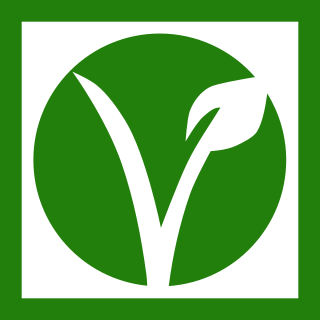
Veganism is the practice of abstaining from the use of animal products and the consumption of animal source foods, and an associated philosophy that rejects the commodity status of animals. A person who practices veganism is known as a vegan.
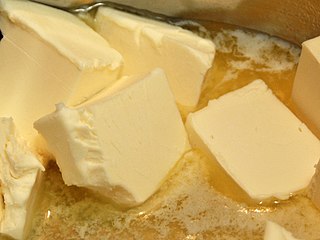
Butter is a dairy product made from the fat and protein components of churned cream. It is a semi-solid emulsion at room temperature, consisting of approximately 80% butterfat. It is used at room temperature as a spread, melted as a condiment, and used as a fat in baking, sauce-making, pan frying, and other cooking procedures.
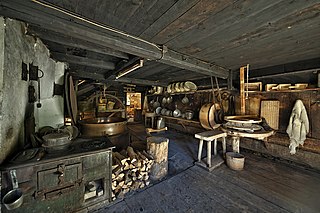
A dairy is a place where milk is stored and where butter, cheese and other dairy products are made, or a place where those products are sold. It may be a room, a building or a larger establishment. In the United States, the word may also describe a dairy farm or the part of a mixed farm dedicated to milk for human consumption, whether from cows, buffaloes, goats, yaks, sheep, horses or camels.
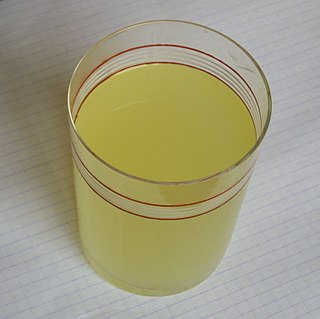
Whey is the liquid remaining after milk has been curdled and strained. It is a byproduct of the manufacturing of cheese or casein and has several commercial uses. Sweet whey is a byproduct resulting from the manufacture of rennet types of hard cheese, like cheddar or Swiss cheese. Acid whey is a byproduct brought out during the making of acid types of dairy products, such as strained yogurt.

A lacto-vegetarian diet is a diet that abstains from the consumption of meat as well as eggs, while still consuming dairy products such as milk, cheese, yogurt, butter, ghee, cream, and kefir, as well as honey.

Whey protein is a mixture of proteins isolated from whey, the liquid material created as a by-product of cheese production. The proteins consist of α-lactalbumin, β-lactoglobulin, serum albumin and immunoglobulins. Glycomacropeptide also makes up the third largest component but is not a protein. Whey protein is commonly marketed as a protein supplement, and various health claims have been attributed to it. A review published in 2010 in the European Food Safety Authority Journal concluded that the provided literature did not adequately support the proposed claims.
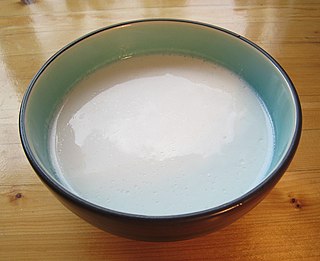
Plant milk is a category of non-dairy beverages made from a water-based plant extract for flavoring and aroma. Nut milk is a subcategory made from nuts, while other plant milks may be created from grains, pseudocereals, legumes, seeds or coconut. Plant-based milks are consumed as alternatives to dairy milk and provide similar qualities, such as a creamy mouthfeel, as well as a bland or palatable taste. Many are sweetened or flavored.

A milk substitute is any substance that resembles milk and can be used in the same ways as milk. Such substances may be variously known as non-dairy beverage, nut milk, grain milk, legume milk, mock milk and alternative milk.

Camel milk is milk from female camels. It has supported nomad and pastoral cultures since the domestication of camels millennia ago. Herders may for periods survive solely on the milk when taking the camels on long distances to graze in desert and arid environments, especially in parts of the Middle East, North Africa and the Horn of Africa. The camel dairy farming industry has grown in Australia and the United States, as an environmentally friendly alternative to cow dairy farming using a species well-adapted to arid regions.

Strained yogurt, Greek or Greek-style yogurt, yogurt cheese, sack yogurt, kerned yogurt or labneh is yogurt that has been strained to remove most of its whey, resulting in a thicker consistency than normal unstrained yogurt, while still preserving the distinctive sour taste of yogurt. Like many types, strained yogurt is often made from milk enriched by boiling off some water content, or by adding extra butterfat and powdered milk. In Europe and North America, it is often made from low-fat or fat-free cow's milk. In Iceland a similar product named skyr is made.

New Harvest is a donor-funded research institute dedicated to the field of cellular agriculture, focusing on advances in scientific research efforts surrounding cultured animal products. Its research aims to resolve growing environmental and ethical concerns associated with industrial livestock production.

Vegan cheese is a category of non-dairy, plant-based cheese analogues. Vegan cheeses range from soft fresh cheeses to aged and cultured hard grateable cheeses like plant-based Parmesan. The defining characteristic of vegan cheese is the exclusion of all animal products.
First Milk is a dairy co-operative in Britain which manufactures cheese, specialist dairy ingredients and whey proteins for its customers, as well as providing traceable fresh milk to a range of dairy manufacturers and food processors. As a dairy co-operative, owned and run by farmers; the area covered by its milk pool runs from the Mull of Kintyre in Scotland down through England and Wales.
Cellular agriculture focuses on the production of agricultural products from cell cultures using a combination of biotechnology, tissue engineering, molecular biology, and synthetic biology to create and design new methods of producing proteins, fats, and tissues that would otherwise come from traditional agriculture. Most of the industry is focused on animal products such as meat, milk, and eggs, produced in cell culture rather than raising and slaughtering farmed livestock which is associated with substantial global problems of detrimental environmental impacts, animal welfare, food security and human health. Cellular agriculture is a field of the biobased economy. The most well known cellular agriculture concept is cultured meat.

Brave Robot is a brand of vegan ice cream made using Perfect Day's synthesized milk proteins. It has no lactose, but does include synthetic molecules reproducing those found in milk.

Remilk is a multi-national Israeli company that specializes in the production of cultured milk and dairy products. The company was founded in 2019 by CEO Aviv Wolff and CTO Ori Cohavi. It has developed a method of yeast-based fermentation to produce milk proteins with an identical chemical compound to that of milk traditionally produced by cows.

Tomorrow Farms is an American food manufacturer known for their "Bored Cow" bioidentical milk alternative that was released in May 2022.




















